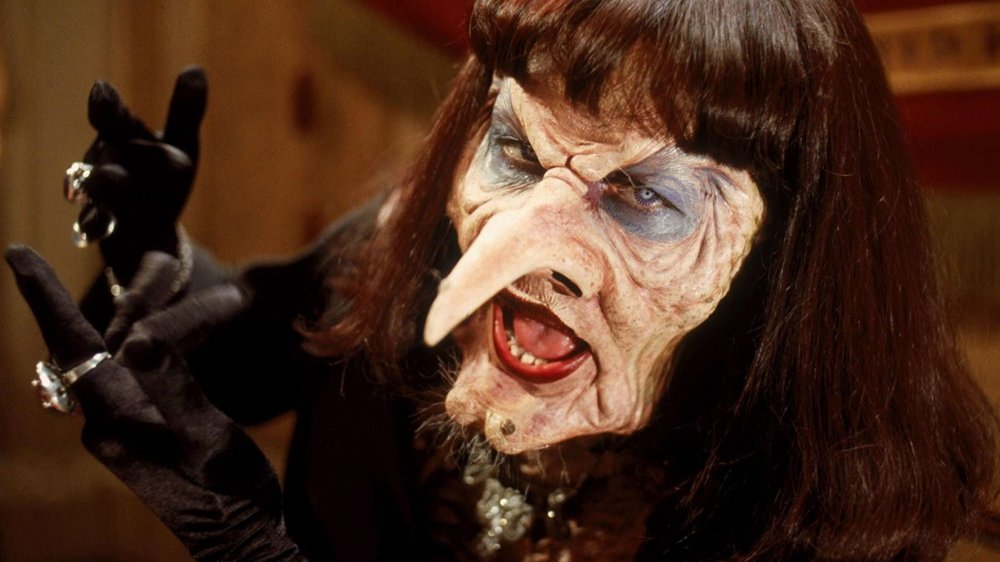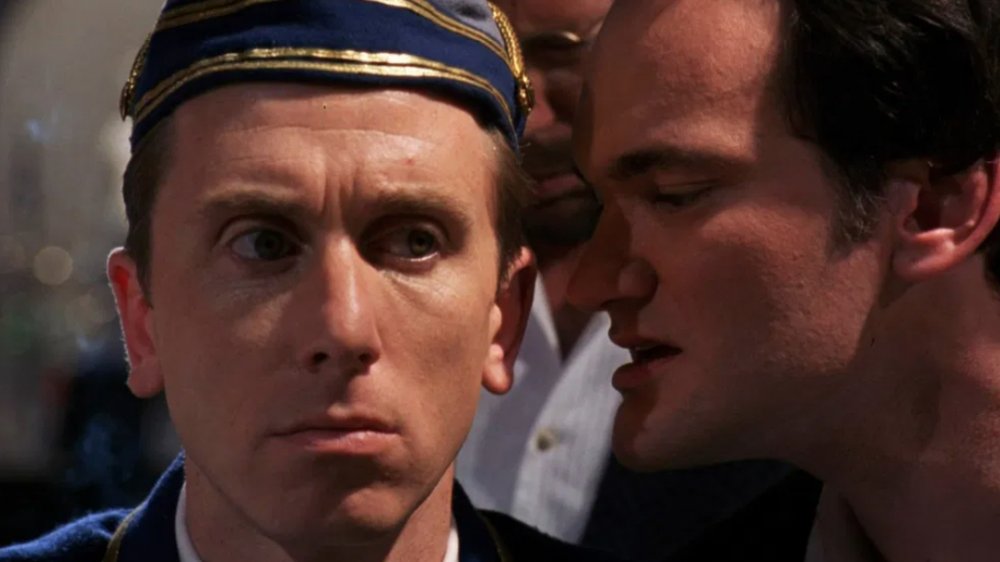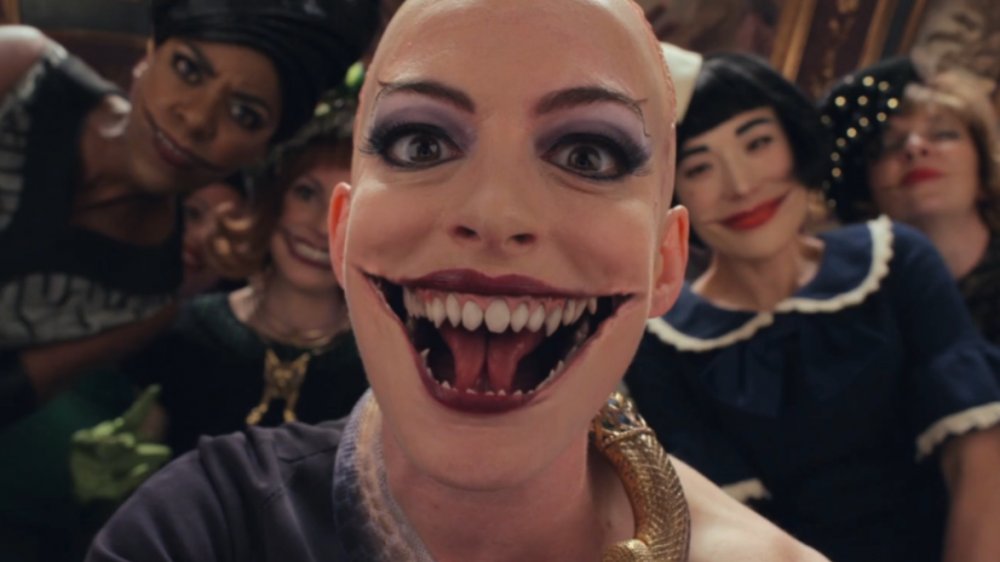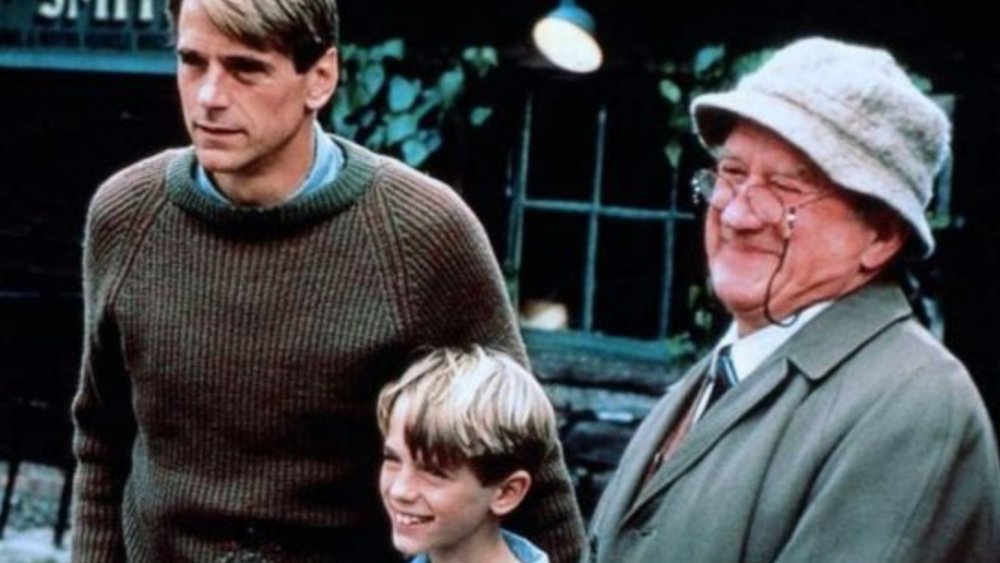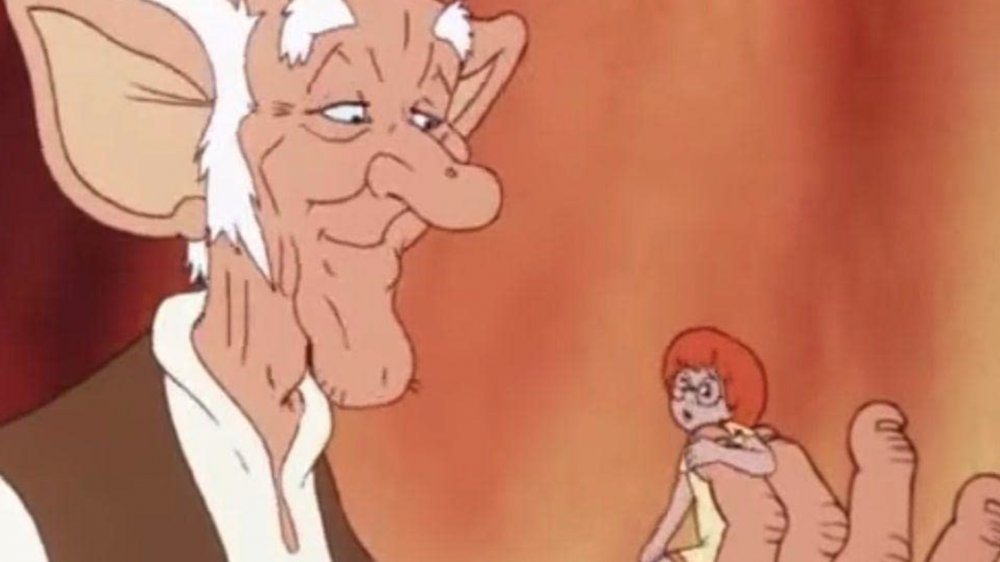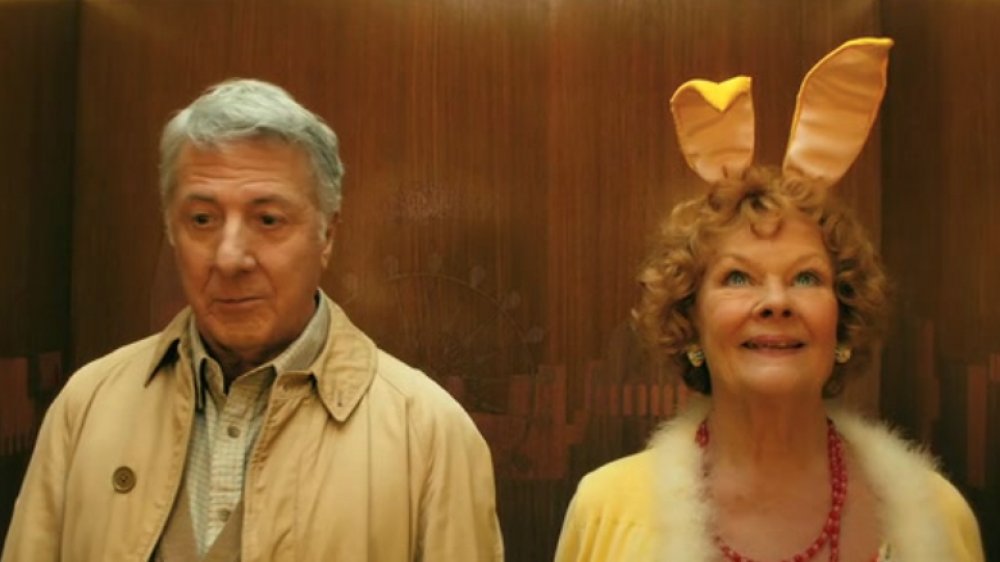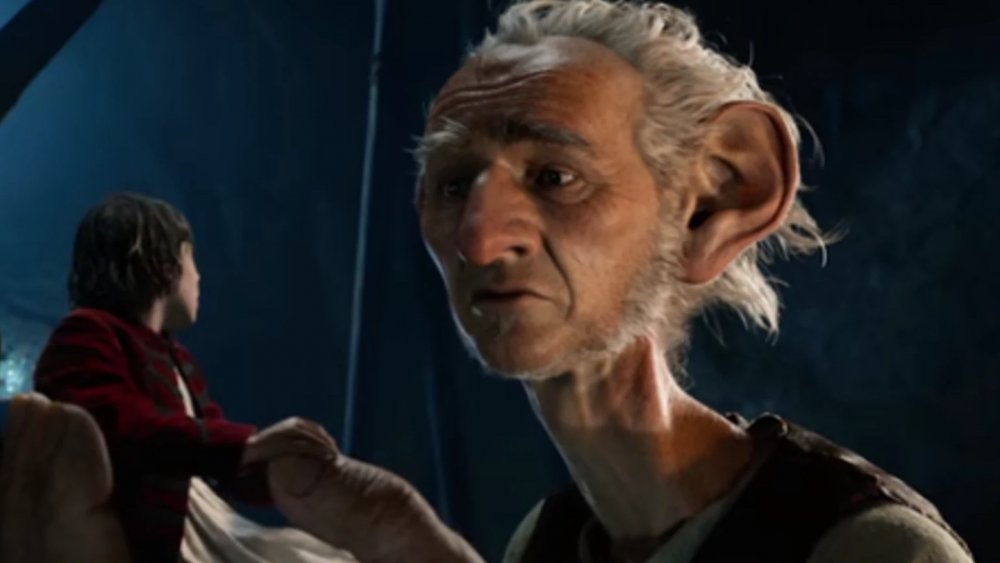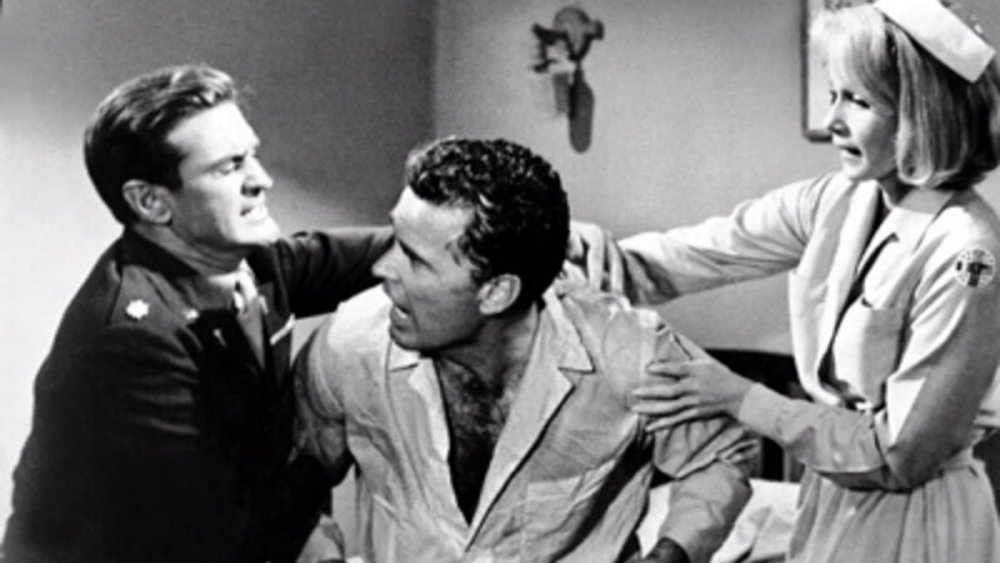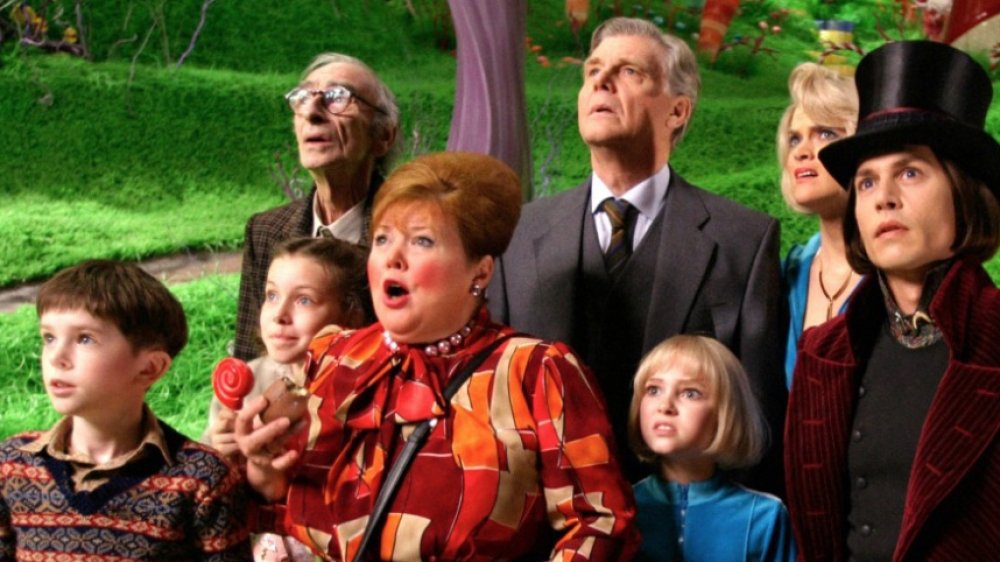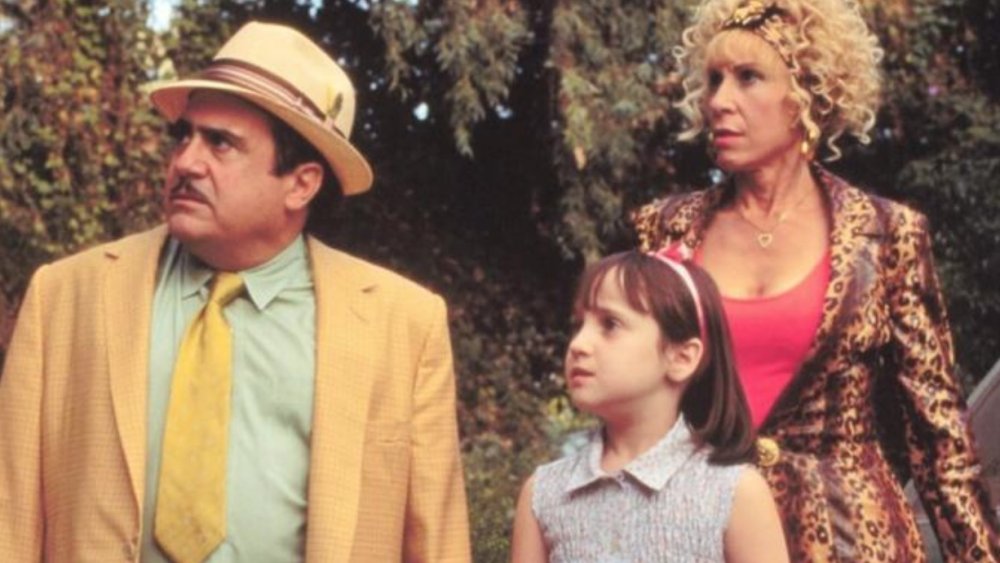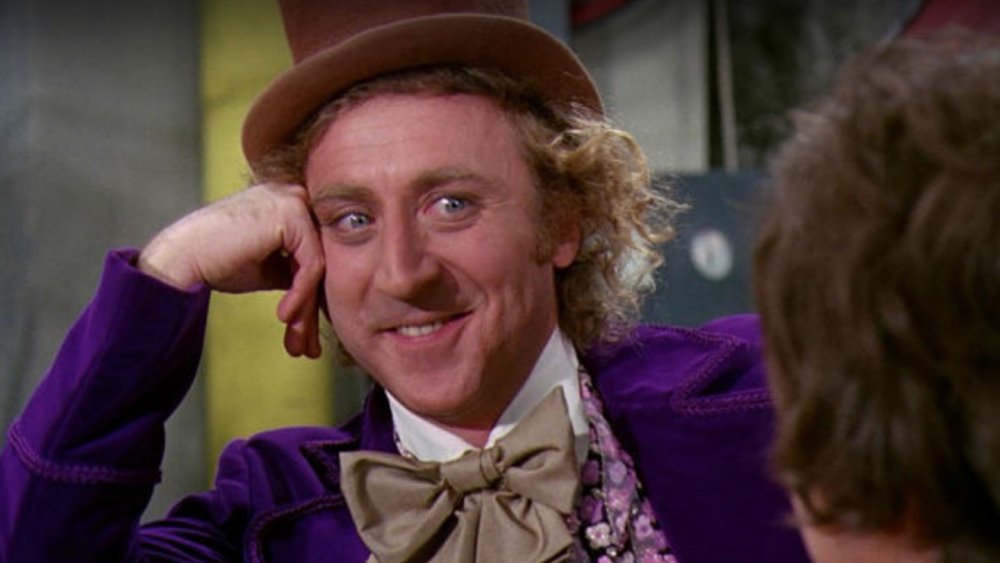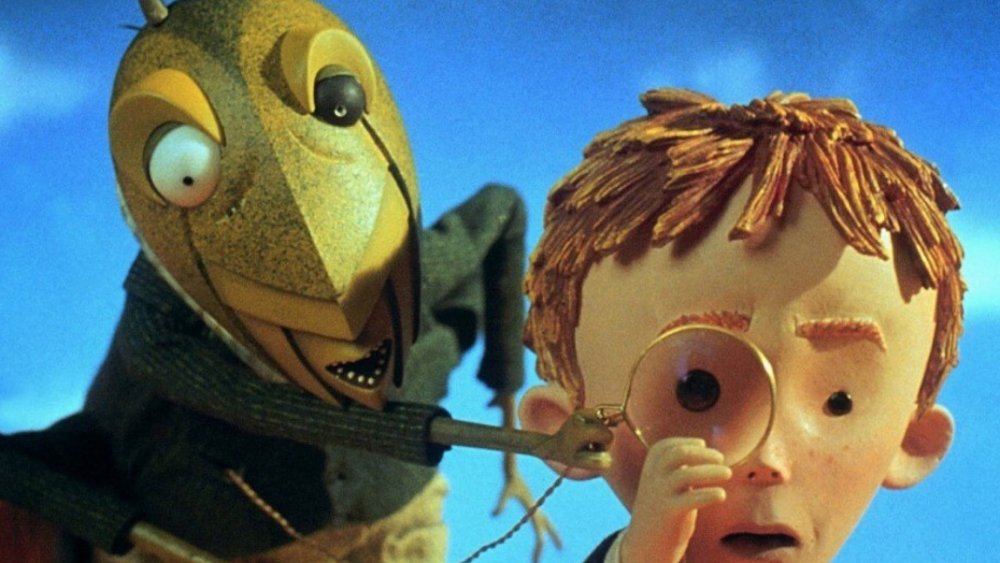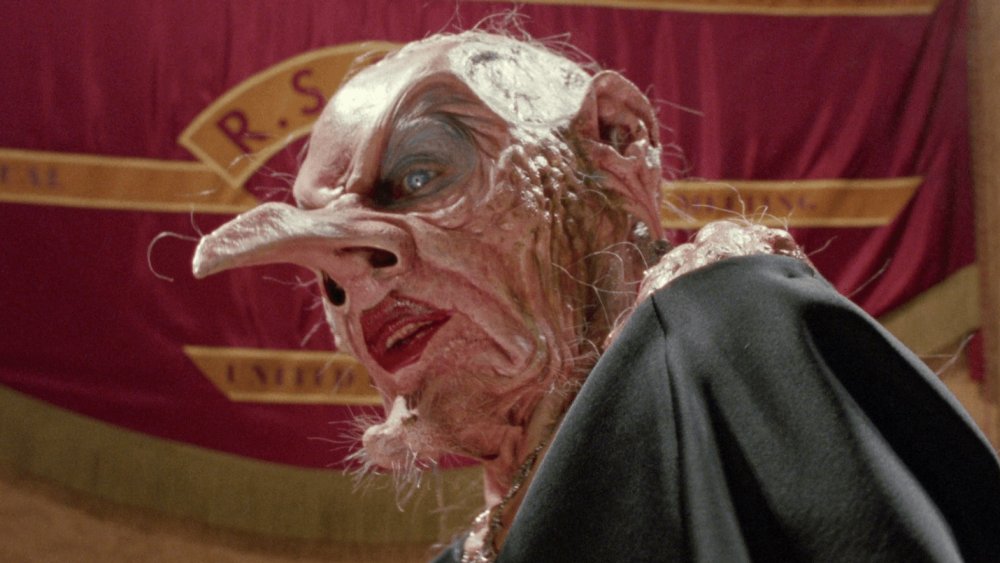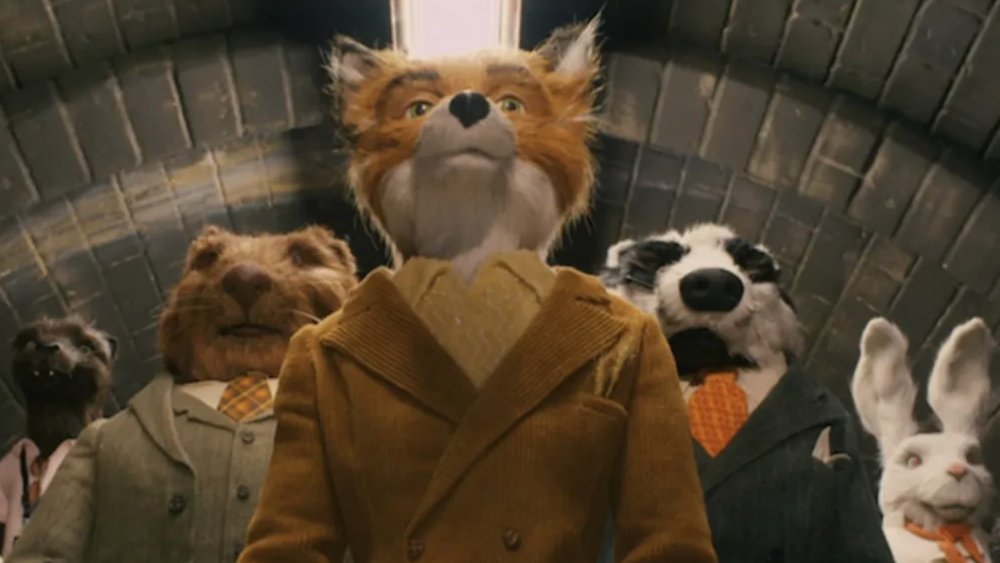Roald Dahl Adaptations Ranked Worst To Best By Rotten Tomatoes
Ace World War II fighter pilot. Wartime spy. Chocolate historian. Medical inventor. Oh, and world-famous, internationally beloved author of classic novels that are still best-sellers decades after his death. Roald Dahl wore many hats in his 74 years, and while most people would be happy to be known for just one of his achievements, he'll be most fondly remembered for his books. Even if you haven't read them (though, if you were ever a ten-year-old, you probably have), you've definitely heard of them and the movies they inspired.
Dahl's work has been brought to life by the biggest names in Hollywood for decades, like James Garner, Gene Wilder, Johnny Depp, Anne Hathaway, George Clooney, Octavia Spencer, Wes Anderson, Tim Burton, Robert Zemeckis, Quentin Tarantino, Steven Spielberg, and we could go on. And while Dahl's contributions as a children's book author are second only to Dr. Seuss, his fiction for grownups has been adapted to film, as well. In fact, you may be surprised what else Dahl has done. Each Dahl adaptation is unique (what else would you expect?), but not all are created equal. Which Dahl adaptations are worth a watch, and which should you skip unless you're a die-hard Dahl fan? Here are the Roald Dahl adaptations ranked worst to best by Rotten Tomatoes!
Four Rooms is Roald Dahl's — and Tarantino's — worst
Quentin Tarantino and Robert Rodriguez made a Roald Dahl movie ... take as much time as you need to process that. This sounds like it could be either the greatest thing ever or the worst. Well, turns out it was the worst. Before QT and Rodriguez teamed up for the anthology film Grindhouse, they were two of the four directors (alongside '90s indie darlings Allison Anders and Alexandre Rockwell) who participated in another anthology film, Four Rooms.
Loosely based on the adult short fiction works of Dahl, Four Rooms is about the myriad misadventures happening at a Hollywood hotel, with four separate segments tied together by the new bellhop, played by Tim Roth. So at least we can be thankful QT and Rodriguez didn't remake one of Dahl's children's classics, as hearing James from James and the Giant Peach spout profanity like Samuel L. Jackson or seeing Matilda murder Ms. Trunchbull a la the Bride in Kill Bill would've been traumatizing to us as ten-year-olds. While none of the director's four individual segments are great, Tarantino's is generally considered passable, though not enough to pass muster with critics. Four Rooms received a 13% critics' score and a 69% audience score on Rotten Tomatoes, making it the worst movie on Tarantino's and Rodriguez's filmographies, as well as Dahl's.
The Witches crash-lands on its broomstick
The Witches was first adapted to the big screen in 1990 and then again 30 years later (37 years after the book was published) in 2020. Well, not the big screen, technically, as Roald Dahl's The Witches debuted instead as an HBO Max original. Set in 1967, the film finds a young orphan boy going to live with his grandmother in the Alabama town of Demopolis (replacing the Norwegian town in the novel), where they encounter witches. Escaping to a seaside town, the boy and his grandmother now find themselves at a witch convention, led by the world's Grand High Witch, who turns the boy into a mouse.
Despite the direction of Robert Zemeckis, a script co-written by Zemeckis and Guillermo del Toro, and the star power of Anne Hathaway, Octavia Spencer, and Stanley Tucci, Roald Dahl's The Witches crash-lands on its flying broomstick. As one critic put it, "Like far too many unnecessary remakes, The Witches doesn't do enough to justify its existence." While Roald Dahl's The Witches might've been meant for movie theaters, the results were mediocre whatever the medium. Actually, make that downright rotten — 51% from critics and 42% from audiences on Rotten Tomatoes. That's not high enough to encourage HBO Max subscriptions, but it's definitely low enough to make Roald Dahl's The Witches one of the worst Roald Dahl adaptations. Despite his name being affixed to the title, we imagine Dahl would want nothing to do with this turkey.
Danny, the Champion of the World never found its audience
Danny, the Champion of the World is a less well-known Roald Dahl novel released in 1975 that inspired a mostly unseen TV movie in 1989. The movie adaptation pairs Jeremy Irons with his son, Samuel Irons, who plays the titular "Danny." Together, the two star as a widowed father and son who live next to a garage the father owns and operates outside a small English village in 1955. When the father refuses to sell his garage to a local developer, the developer organizes a pheasant hunt to entice the local elite. But Danny and his dad have something up their sleeves, and they get even with the developer and his cronies.
The movie isn't especially memorable, though it did inspire one critic to say that it "resurrects a lost world of English life and entertainment with winning charm and aplomb." And when we say one critic, we mean the one and only critic. Danny, the Champion of the World has no critics' score, however, its audience score is an underwhelming 64%. Maybe if more people saw it, the score would be higher, but as it stands, Danny may be the champion of the world, but he's not the champion of the Tomatometer.
The BFG was a big freaking dud
Released in 1982, Roahl Dahl's The BFG (short for Big, Friendly Giant) is about a nice and jumbly giant — one very different from his mean, bone-crunching, child-eating peers — who befriends a precocious little girl named Sophie. When Sophie discovers that the other, not-so-friendly giants are heading to England to chow down on some children, she enlists the BFG to help her. Only Roald Dahl could make a story about giants eating children so playfully delightful, but that's why he's such a legend.
Dahl's story was first adapted to the screen in 1989 as an animated feature. You'll be forgiven if you haven't seen it or even heard of it. Nobody else has. The BFG only has two critical reviews, so it doesn't even have an official Tomatometer score, though one critic praised it as a "giant tale of imagination with a dark side," while another panned it as "slight and unimpressive." So call it a wash. The audience score is an equally underwhelming 65%, still fresh, but not Fresh! While The BFG would go on to bigger and better things, the 1989 animated film was a BFD — big freaking dud.
Esio Trot deserves a bigger audience
Esio Trot is Roald Dahl's last published novel, and it's the kind of love story you would expect Dahl to write. Mr. Hoppy is a retired, shy, lonely old man who's infatuated with his neighbor, the widow Mrs. Silver. Alas, Mrs. Silver's attentions are focused on her pet tortoise, Alfie. Mrs. Silver is distressed Alfie hasn't gotten bigger since she's gotten him, as she wishes him to grow into a larger, more dignified reptile. Mr. Hoppy hopes to win her love with magic words that will make the tortoise grow, starting with "Esio Trot."
Esio Trot was adapted into a BBC television film in 2015, with Dustin Hoffman as Mr. Hoppy, Judi Dench as Mrs. Silver, and James Corden narrating. The charming adaptation received acclaim, but it wasn't widely seen across the pond. Consequently, Esio Trot doesn't have an official critics' score on Rotten Tomatoes, though the one critic who reviewed it said it was "a decidedly daffy, rather ridiculously resplendent reptilian elder romance, don't ask." Those who watched it quite enjoyed it, giving it an audience score of 72%. Maybe the movie is more tortoise than hare, but as it stands, Esio Trot deserves a bigger audience.
The BFG is so-so Spielberg
Steven Spielberg decided to take on Roald Dahl's The BFG in 2016 under the Disney banner. Spielberg. Dahl. Disney. Sounds like the perfect combo, right? Much like Dahl's children's books, Spielberg's family movies never shied away from the darker side of childhood, such as divorce in E.T. and absent parents in Hook. Meanwhile, Disney is Disney, a company that built its multi-billion-dollar, international brand on appealing to all ages and has done so since well before your grandparents were even born. The results of this historic pairing were ... okay.
The critical consensus was that The BFG "minimizes the darker elements of Roald Dahl's classic in favor of a resolutely good-natured, visually stunning, and largely successful family-friendly adventure." In other words, it's safe and so-so Spielberg. Other critics were more, well, critical, saying, "Spielberg has become a hit-and-miss filmmaker, and this is closer to a 'miss' than a 'hit.'" The critics' Tomatometer score is currently at 74%, while audiences were much less impressed, giving it a 57%. Who would've thought the combined creative mights of Spielberg, Dahl, and Disney would make something so mediocre?
36 Hours is a surprising suspense thriller from Roald Dahl
Roald Dahl cemented his legend by writing children's books, but he made his living by writing just about everything, including adapting Ian Fleming's children's story Chitty Chitty Bang Bang for the big screen and conceiving the original story for the James Bond flick You Only Live Twice. Among Dahl's more interesting entries is the 1965 suspense thriller, 36 Hours, which holds the distinction of being the first film adaptation of his work.
Set in occupied Germany in 1949, James Garner plays an American military officer whose last memories were General Eisenhower's final directives before the Normandy invasion five years before. But soon, the American officer realizes the psychiatrist he thought was trying to help him is actually out to get him. The title 36 Hours is explained by the film's poster, which says, "Give me any American for 36 hours, and I'll give you back a traitor."
Based on a Dahl short story from 1944, "Beware of the Dog," this story shows Dahl was in a very different place during the war (being a spy and fighter pilot can do that to you). However, the results are impressive, on the page and the big screen, as 36 Hours boasts an 80% critic's score and a 77% audience score. So that score makes 36 Hours currently one of the best Roald Dahl adaptations and the best adaptation based on his non-children's fiction.
Depp, Burton, and Roald Dahl made a sweet combo
Johnny Depp could do no wrong in the mid-2000s. He'd just redefined himself from quirky actor to quirky A-lister with Captain Jack Sparrow in Pirates of the Caribbean: Curse of the Black Pearl. One year before the sequel, Pirates of the Caribbean: Dead Man's Chest, came out and broke all the records in 2006, Depp took a detour to Dahl. In 2005, Depp reunited with his buddy Tim Burton to play Willy Wonka in arguably Roald Dahl's most famous story, Charlie and the Chocolate Factory.
While it may have seemed counterintuitive, Burton's cinematic sensibilities toward the creepy and the spooky were actually the perfect fit for Roald Dahl's work, which always managed to blend the surreal and scary with the silly. Besides, you weren't going to get a better actor to play the world-famous but notoriously reclusive chocolatier in the 2000s than Johnny Depp. The team had their work cut out for them, as they weren't only adapting Dahl's beloved book but would also be compared to the iconic 1971 film, Willy Wonka and the Chocolate Factory. Burton, Depp and team were up to the task, as Charlie and Chocolate Factory scored an 83% critic's score, though moviegoer's didn't find the film nearly so sweet, giving it a rotten 51%.
Matilda is magical
Danny DeVito is a national treasure, but you already know that. Before he reinvented himself as Frank Reynolds in It's Always Sunny in Philadelphia, he was actually an acclaimed actor and filmmaker, having directed such wildly divergent works as Throw Momma From The Train, The War of the Roses, Hoffa, and Death to Smoochy. Among his most famous films was the 1996 adaptation of Roald Dahl's Matilda. Released in 1988, Matilda is arguably Roald Dahl's last great work, and it tells the story of a young girl named Matilda Wormwood who has wicked parents, a cruel headmistress, and extraordinary powers. So it's kinda like Carrie, only it's a children's book.
DeVito cast himself and his then-wife Rhea Perlman as Matilda's parents, and Mara Wilson of Mrs. Doubtfire and Miracle on 34th Street earned the role of the eponymous Matilda. Critics noted that "while the movie diverges from Roald Dahl, it nonetheless captures the book's spirit." Matilda also captured an impressive Tomatometer score, too — 90% from critics and 73% from moviegoers. However, the most touching part of the movie happened off-screen. Tragically, Mara Wilson's mother lost her battle with breast cancer before Matilda was released, so she never got to see the film ... or so Mara thought. She later found out that Danny DeVito brought a cut of the movie to the hospital for her mother to watch before she died. Like we said, national treasure.
Willy Wonka is an all-time children's movie classic
Willy Wonka and the Chocolate Factory is more than the movie that launched a million "tell me more" memes. It's arguably the most iconic Roald Dahl movie adaption. Heck, it's one of the most iconic family movies of all time, period, even if Grandpa Joe is still a huge jerk for staying in bed for decades while his family suffered horrendous poverty until his grandson got the golden ticket. Man, what a jerk. Anyway, Willy Wonka and the Chocolate Factory has charmed viewers of all ages since it was released in 1971. Perhaps not surprisingly, one viewer who wasn't charmed was Roald Dahl.
According to a biography of the author by his friend Donald Sturrock, Dahl reportedly didn't care for the music or the director and had "serious reservations" with Gene Wilder's performance as the titular Willy Wonka. Yep, Dahl did not care for Wilder's Wonka, which would go down as one the most memorable performances in any children's movie ever. According to Sturrock, "Roald eventually came to tolerate the film. ... But he never liked it." Dahl was mostly alone in his assessment of Willy Wonka and the Chocolate Factory, which boasts a 90% critics' score and an 87% moviegoers' score. And let's be honest, Dahl was probably pleased with the bounce in book sales he got from its success. That's enough to even get that jerk Grandpa Joe out of bed.
James and the Giant Peach is fresh
It took decades for filmmakers to realize Roald Dahl was perfect for stop-motion animation. That film was 1996's James and the Giant Peach, released 35 years after the book's publication, and it's one of the best Roald Dahl adaptations according to Rotten Tomatoes. Nine years before Tim Burton directed a Dahl adaptation (Charlie and the Chocolate Factory), he produced James and the Giant Peach by employing the same stop-motion techniques as the surprisingly successful and instantly iconic stop-motion film The Nightmare Before Christmas in 1993.
Directed by Nightmare director Henry Selick, James and the Giant Peach was praised by critics for its "arresting and dynamic visuals, offbeat details, and light-as-air storytelling." Critics gave it an impressive 91% Tomatometer score, though moviegoers were much less impressed, giving Peach an unripened 66% score. Moviegoers' apathy with James and the Giant Peach was reflected in the film's box office, which bombed hard with a meager $28 million worldwide, less than a third of what The Nightmare Before Christmas made.
The Witches casts a wicked spell
When it comes to enchanting fantasy stories that entertain children and adults, Roald Dahl has few peers who are at his same level. One, most assuredly, is Jim Henson, the creator of Sesame Street and The Muppets. Dahl's storytelling and Henson's creative sensibilities came together in 1990's The Witches, and the results were magical. Directed by Nicolas Roeg (who directed the chilling 1973 horror movie Don't Look Now and the trippy 1976 David Bowie film The Man Who Fell to Earth), The Witches is a "dark and witty movie [that] captures the spirit of Roald Dahl's imagination like few other adaptations" according to critics.
Critics also praised Anjelica Huston's "deliciously wicked performance" as the Grand High Witch, and of course, Jim Henson's "imaginative puppetry." Sometimes a host of super-talented people come together, and for whatever reason, the results just don't work. That is most definitely not the case with The Witches, as everybody was on top of their game to produce one of the most impressive and faithful adaptations of Roald Dahl's work, with the Tomatometer score to prove it — 93% from critics and 70% from audiences.
Mr. Fox is fantastic Roald Dahl adaptation
Fantastic Mr. Fox is truly worthy of its name. Roald Dahl published the anthropomorphic adventures of Mr. Fox, Mrs. Fox, their four small foxes (and a host of other animals) in 1970, and in 2009, Wes Anderson adapted the story for his first venture into stop-motion animation. While Fantastic Mr. Fox's brisk 96 pages are as delightfully Dahl as it gets, the story isn't as synonymous with the author as books like Charlie and the Chocolate Factory or Matilda. However, the quirky whimsy of Dahl's lesser-appreciated story matches perfectly with Anderson's cinematic sensibilities.
While the two acclaimed artists never met (Dahl died in 1990, and Anderson's debut was Bottle Rocket in 1996), the filmmaker behind Moonrise Kingdom, The Grand Budapest Hotel, and Isle of Dogs clearly shares a creative kinship with Dahl. One imagines Wes Anderson reading Dahl as a boy in Texas, as his cinematic output has that same childlike spirit. But Fantastic Mr. Fox's appeal isn't confined to kids, as every age will enjoy it. With a 93% critics' score and 85% audience score, Fantastic Mr. Fox is the best Roald Dahl adaptation according to Rotten Tomatoes!
